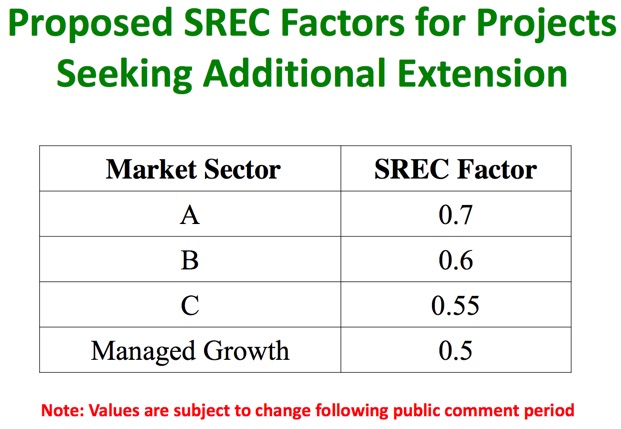On January 31, 2017 the Massachusetts Department of Energy Resources (DOER) unveiled their final program design for a new solar incentive mechanism following the very successful SREC-II program. The forty-seven slides linked above provide a highly-detailed review. Below, please find a brief summary of pertinent issues. Please keep in mind this information is proposed by DOER. Stakeholders are encouraged to submit comments to DOER.SREC@state.ma.us by February 17.
SREC-II
SREC-II will continue until the new scheme is implemented with reduced SREC-factors (30% of original). Expected fuse left on SREC-II development: through 2017

Projects that did not qualify in time for the January 8th deadline will lose their Assurance of Qualification and have to re-apply. New projects may also apply for SREC-II qualification.
Please note that projects 25kW or less will continue to be approved at the 0.8 SREC Factor until the next program begins. The 0.7 SREC Factor for the extension only applies to those projects in market sector A that are over 25kW.
New Program (SMART)
Goal: 1600MW of new solar
Incentive mechanism: Declining Block with payment in the form of Net-metering credits or on-bill credits. Additionally, a buy-all, sell-all rate will be available.
Incentive level: set once through a procurement of 100MW of large (> 1MW) projects. Such large projects will offer into the procurement and the marginal project will set the price for all winning projects. Large projects will have a 20-year payment term. Smaller projects will have their incentive level set by an index relative to the level determined by the competitive procurement described above. Small projects will have a ten-year payment term.
Incentive adders: Depending on location, type of off-taker and the addition of storage to a solar array, a project may earn a higher rate of incentive.
Both the base incentive level and incentive adders will decline 4% per block.
Process: DOER will file an Emergency Regulation which will trigger a 90-day regulatory process including hearings and written comments. Following the Emergency Regulations being implemented, three additional processes will occur: 1) RFP for Administrator of this program 2) RFP for 100MW of new PV (> 1MW only), 3) EDCs jointly file at DPU for cost recovery and approval.


